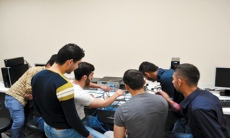Civil Engineering Job Description
Civil engineers plan types of structures, including buildings and highways. They work with architects on design and focus a great deal on safety, determining the best materials and methods for particular kinds of construction.
Civil engineers also conduct environmental studies to prevent water and soil contamination during construction.
Civil engineers are responsible for the building of civilian projects and infrastructure such as bridges,, highways, tunnels, airfields, water and sewage systems. They are the people who ensure that the projects are built within safety regulations. Civil engineers find work in architectural companies, construction businessses and within all level of government.
Basic Job Description
• Civil engineers plan the construction of and assist in designing buildings, bridges, highways, railroads, tunnels, subways, airports, harbors, dams and water treatment plants.
Function
• Most civil engineers will specialize in one area such as structural, construction, hydraulics, sanitary, environmental, transportation or soil mechanics engineering. Structural engineers work alongside architects to design buildings and other structures, while those specializing in construction supervise the actual construction process.
Those who work in hydraulics help with the building of canals and other waterway systems such as irrigation networks and flood-control systems. Sanitary engineers design systems that purify water and treat waste products, while environmental engineers help to contain water and air pollution, and transportation engineers plan highways, airports and railroads. Soil mechanics engineers are responsible for improving the foundations of structures built on soil.

Qualifications
• A civil engineer must have a Master’s degree or BE (in some universities) in civil engineering from an accredited school. These are normally five-year programs and include courses in fluid mechanics, circuitry, stress analysis, structural design and thermodynamics. Many of these programs offer students the ability to split their time between academic study and practical work experience.






















